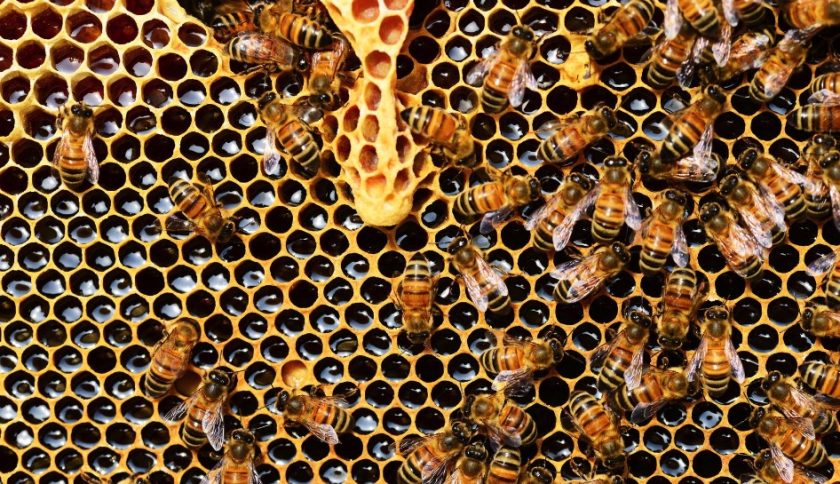Welsh beekeepers say “thank you” to carers on World Bee Day

Welsh beekeepers should have been joining forces with their global counterparts at an event in London to celebrate World Bee Day today, May 20.
Instead, they are marking the day by recognising the work of those caring for the sick and elderly during the coronavirus pandemic and sharing their activities on-line with the worldwide beekeeping community.
Several will be delivering jars of Welsh honey to local care homes and hospitals. The aim is to give staff a little pick-me-up and show their gratitude to those who are putting themselves on the frontline.
The group of beekeepers are members of the Welsh Government Welsh Honey Cluster. The Cluster is a business development programme which by providing sector-specific support aims to help Welsh honey businesses to create jobs and achieve sustainable economic growth.
Welsh Honey Cluster Lead, Haf Wyn Hughes said:
This is the beekeepers’ way of saying ‘thank you’ to those who are working on the frontline at this turbulent and worrying time.
There has been an increase in demand for Welsh honey, and beekeepers have been at the forefront of encouraging consumers to buy local produce.
Last month the Welsh Honey Cluster created a location map of Cluster members to raise the consumer’s awareness. Now those members are celebrating World Bee Day by supporting their own local communities.
The importance of bees to the ecosystem cannot be underestimated with as many as 170,000 plant species relying on pollination by bees. This, in turn, amounts to every third spoonful of food being dependent on pollination.
Each year, the UK produces 3,000-4,000 tonnes of honey – of which around 10 per cent comes from Wales. However, that is less than one per cent of the total amount of honey consumed in the UK, as around 35,000 tonnes are imported to meet consumer demand.
Welsh honey is perceived as a premium product by consumers. Honey cannot be manufactured – the only way to increase availability of Welsh honey is to increase the number of honey bee colonies in Wales and to develop routes to market. Taking part in World Bee Day is an important opportunity for Welsh beekeepers to gain international recognition.
said Haf.
Designated by the United Nations, World Bee Day was established to acknowledge the role of bees and other pollinators to sustainable development, food security and biodiversity.
The date was chosen in recognition of Slovenian apiarist, Anton Janša. He is acknowledged as the pioneer of beekeeping and was born in Carniola (now Slovenia) on May 20th, 1734.
The Slovenian Embassy, which should have been hosting the World Bee Day celebrations, is calling on beekeepers to raise further awareness of the crucial role of bees in sustaining our natural environment, by taking part in its social media campaign.
Beekeepers across the world will be sharing their activities via social media and using the hashtags #WorldBeeDay #SavetheBees.
The Welsh beekeepers will also be using the hashtag #WelshHoneyCluster, and the donated jars of honey will also feature the Welsh Honey Cluster logo.
Slovenian Ambassador Tadej Rupel said:
Even at this time, when normal life seems to be on hold as people all around the world take unprecedented measures to help suppress the COVID-19 pandemic, the sustaining activity of our industrious bees continues without interruption as they busy themselves in the pollination of plants and honey production. Just as they have for countless millennia, and in complete harmony with nature.
I am therefore delighted that Wales and the Honey Cluster is taking part in the activities to celebrate World Bee Day and is joining us in further raising awareness of the crucial role of bees in sustaining our natural environment.
Lesley Griffiths, Minister for Environment, Energy and Rural Affairs, said:
I would like to thank all of the members of our Welsh Honey Cluster who have taken part in this effort to show their support for carers.
I’m sure their efforts will be appreciated by those who continue to provide vital care across Wales.
I am also very pleased to see that there has been an increased demand for Welsh honey, and our beekeepers should be congratulated for their continued efforts in supplying their products, and keep supply chains moving, during a difficult time for many across the food and drink sector.
I would also like to thank everyone who has continued to work as part of the Bee Friendly initiative, co-ordinating efforts to make Wales a pollinator-friendly nation.
Their hard work supports not just businesses, but communities, and though the events scheduled for World Bee Day can no longer take place with in-person attendance, I’m sure many will want to take the opportunity to celebrate this vital sector all the same, and I would encourage consumers to continue to maintain the recent increase in demand seen for Welsh honey.
Spotted something? Got a story? Email: [email protected]
Latest News
